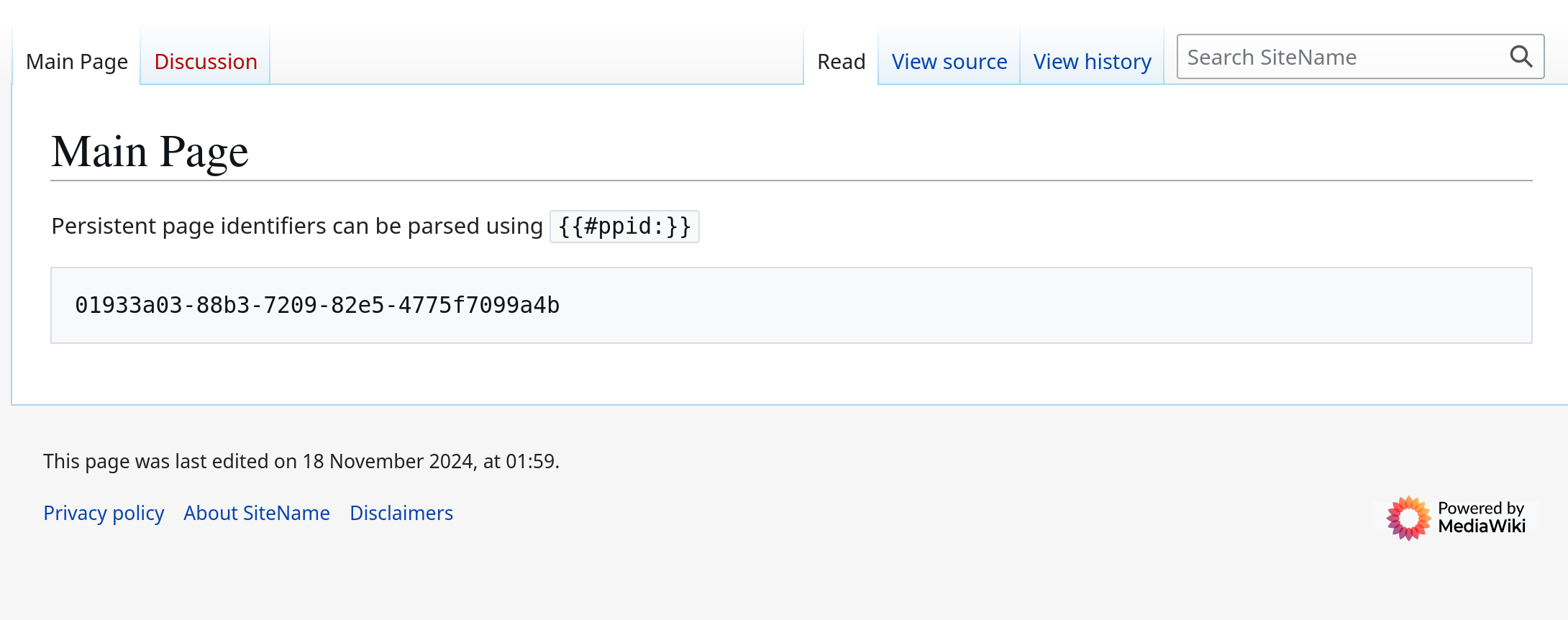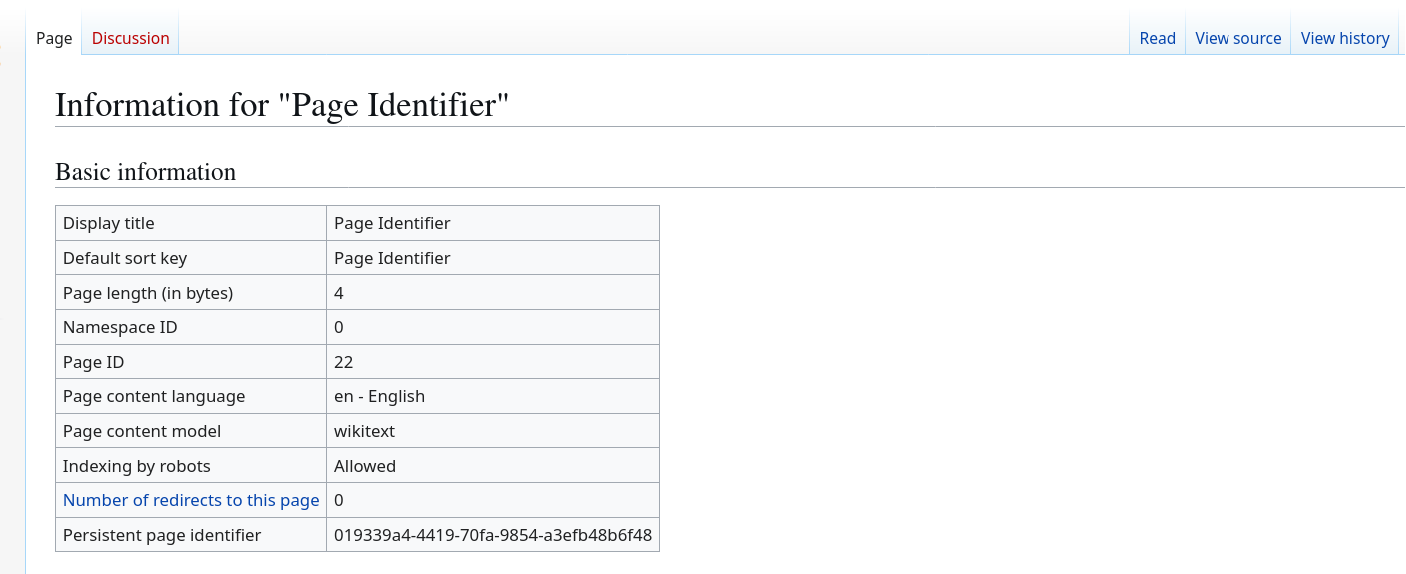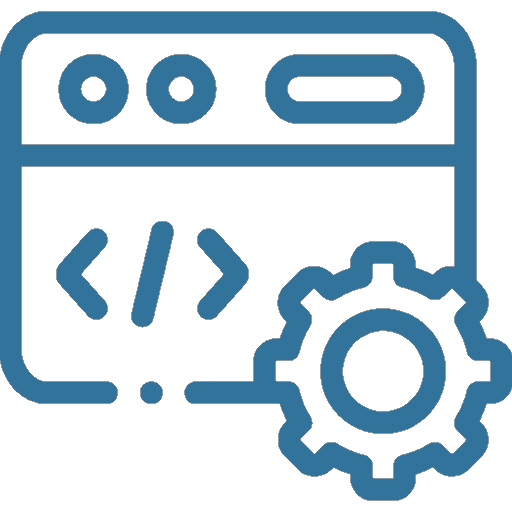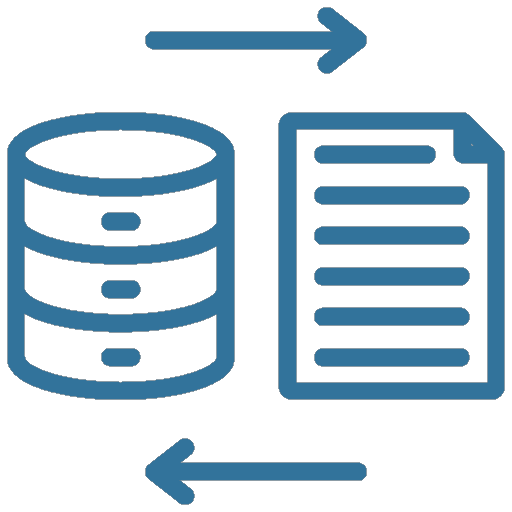Persistent Page Identifiers
Stable unique identifiers for your wiki pages
Reference your pages with UUIDs or PURIs

On this page
External links
Persistent Page Identifiers for MediaWiki
Reference your wiki pages with stable, unique identifiers that remain unchanged even when pages are renamed, moved, or deleted and restored.
Each page automatically receives a unique persistent ID upon creation.
The extension generates UUID v7 IDs. Future versions might add support for other ID types, such as nanoid-style IDs. UUIDs (Universally Unique Identifiers) are 128-bit numbers represented as 32 hexadecimal digits separated by hyphens. Example: 123e4567-e89b-12d3-a456-426614174000
You can access the identifiers via the page information tab (?action=info),
parser functions,
and the REST API.
Persistent Page Identifiers can be used together with both Semantic MediaWiki and Wikibase.
It is possible to configure how your IDs are displayed.
Professional Wiki created Persistent Page Identifiers. We are MediaWiki developers that provide professional MediaWiki services.
We thank Meemoo and Podiumkunsten for funding initial development.

Usage Documentation
Parser Function
To display a page's persistent identifier within the page content, use the parser function
{{#ppid:}}.

Semantic MediaWiki users can store the ID with {{#set:PPID={{#ppid:}}}},
where PPID is the name of their semantic property.
API
Get persistent identifiers via the REST API by MediaWiki page ID:
GET /persistent-page-identifiers/v1/pages?ids=123|456{
"identifiers": {
"123": "00000000-0000-0000-0000-000000000042",
"456": "00000000-0000-0000-0000-000000000043"
}
}Generate IDs for Existing Pages
For wikis with existing pages that were created before installing this extension, you can generate persistent identifiers using the maintenance script:
php maintenance/GenerateMissingIdentifiers.phpThe script will only generate identifiers for pages that don't already have one, processing them in batches for optimal performance.
Resolver Page
The extension adds a resolver page to your wiki that redirects to the page associated with the
persistent identifier. This page is accessible at Special:PersistentPageIdentifierResolver and
listed on Special:SpecialPages.

You can navigate directly to the resolver page and submit your persistent identifier via the form.
However, you can also use the resolver page for immediate redirection without the user ever seeing the form.
For example, if you have a page with the identifier 123e4567-e89b,
you can visit Special:PersistentPageIdentifierResolver/123e4567-e89b
to be redirected to the page. This goes well together with configuration like the below,
since the IDs will be URLs that resolve to their associated pages.
$wgPersistentPageIdentifiersFormat = 'https://example.com/wiki/Special:PersistentPageIdentifierResolver/$1'You can create shorter URLs with the appropriate rewrite rules in your web server configuration.
Installation
Requirements
- PHP 8.1 or later
- MediaWiki 1.39 or later
Load and enable
Load the extension using Composer:
COMPOSER=composer.local.json composer require --no-update professional-wiki/persistent-page-identifiers:~1.1Enable the extension by adding the following to your LocalSettings.php:
wfLoadExtension( 'PersistentPageIdentifiers' );You can verify the installation by checking your wiki's Special:Version page.
If you already have wiki pages, you probably want to generate IDs for them.
Configuration
Persistent Page Identifiers only has optional configuration. Change configuration via LocalSettings.php.
Persistent Identifier Format
This format affects how identifiers are displayed everywhere in the extension, including the page information tab, parser function output, and API responses.
$wgPersistentPageIdentifiersFormat = '$1'; // Default value
// Becomes something like 123e4567-e89b-12d3-a456-426614174000Example usage:
-
PURIs (Persistent Uniform Resource Identifiers):
$wgPersistentPageIdentifiersFormat = 'https://example.com/id/$1'; // Becomes something like https://example.com/id/123e4567-e89b-12d3-a456-426614174000 -
Add a prefix or suffix:
$wgPersistentPageIdentifiersFormat = 'wiki_$1'; // Becomes something like wiki_123e4567-e89b-12d3-a456-426614174000
More MediaWiki Extensions
Professional MediaWiki Services
MediaWiki services by the authors of Persistent Page Identifiers

Get superior results from the best MediaWiki developers with a proven track record of creating MediaWiki extensions & integrations.

Make your wiki look great! Use a time-tested responsive MediaWiki theme, or have us create a custom MediaWiki skin for you.

Let us take care of your wiki. We are MediaWiki hosting experts and provide cloud hosting, dedicated hosting, and on-premise hosting.

Bring your wiki to the next level by leveraging our MediaWiki expertise. From strategic planning to wikitext, we have you covered.

Migrate your wiki with confidence. We move your MediaWiki to a new home, or we help you migrate from another system to MediaWiki.

Keep your MediaWiki up-to-date and secure. We offer MediaWiki maintenance services to keep your wiki running smoothly.